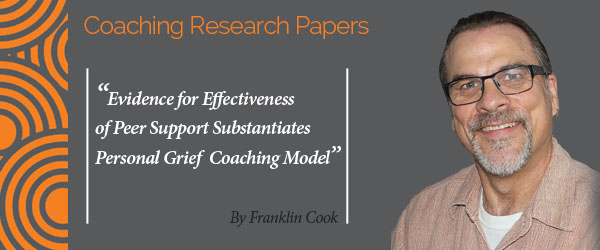A Research Paper created by Franklin Cook
(Grief Coaching and Recovery Coaching, UNITED STATES)
Personal Grief Coaching (PGC) is an interpersonal helping model designed for the benefit of bereaved people affected by the traumatic death of a loved one.[1] This essay is the first in a series that explains this new approach to helping people cope with grief and loss.
Life Coaching is one of the main influences behind the development of PGC, and although the purpose of this essay is to explain the relation-ship between Peer Support and PGC, it is necessary first to touch briefly upon aspects of Life Coaching that are especially applicable to PGC. A definition offered by McCluskey (2012) captures very well the common ground between the two practices: “A life coach’s primary role is to help clients … discover for themselves, through relationship with the coach, what lies uniquely within themselves.” The helping relationship in PGC, as in Life Coaching, is a partnership governed by the client’s own desires, intentions, and goals for reaching his or her full potential. The primary agent of change in PGC, as in Life Coaching, is the client himself or herself working constructively from the “inside-out,” rather than the change agent being a treatment or remedy applied from the “outside-in.” PGC focuses on the client’s inherent capacity to function as a whole per-son whose nature is generative and whose innate propensity is to strive for healthfulness. [2]
This essay covers PGC’s links to Peer Support, and future essays in the series will explain the new model’s relationship to the other foun-dational ideas that influenced its development, namely Dialogue, Servant Leadership, Person-Centered Helping, Meaning Making, Mindful Aware-ness, and Compassion. The relationship of Peer Support to PGC is being explained first because it is the idea that, more than anything else, distinguishes PGC from other coaching practices. Although the principles of Peer Support share an enormous amount of common ground with those of various types of coaching (as will be clearly evident throughout this essay), the defining feature of peer grief support—the requirement for the helper to have had a loss similar to the client’s—sets PGC apart as a narrowly circumscribed coaching specialty. PGC is assistance pro-vided by a helper who has had a traumatic loss similar to that experi-enced by the bereaved person being helped.[3] In other words, PGC is designed to help people bereaved by a traumatic loss, utilizing as one of its sources of helpfulness the fact that the PGC practitioner is a person who himself or herself has survived a traumatic loss.[4]
Another benefit of highlighting Peer Support to begin with is that it is an emerging practice associated with a growing accumulation of evidence for its effectiveness. Outlining the components of Peer Support that show promise as effective ways to help people with the challenges they face and linking Peer Support to the PGC model makes it evident that PGC is a potentially effective practice for helping traumatically bereaved people successfully navigate their journey through grief and loss. This essay, therefore, is organized around the characteristics of Peer Support for which there is some evidence of effectiveness: Studies of peer-delivered services show that experiential knowledge, trust, and confidentiality (Money, et al., 2011); individual connectedness (CDC, 2011); and empow-erment (Campbell & Leaver, 2003) all contribute to positive outcomes for the populations served. [5]
[1] The death of a loved one by any means is tragic, and PGC can be helpful to all kinds of bereaved people. It was developed primarily, however, for people who have experienced a traumatic death (a death caused by a person, misfortune, affliction, or catastrophe, such as suicide, homicide, accidental injury, medical emergency, or natural disaster).
[2]The PGC model differs from the medical model, which involves an expert treating a patient who is afflicted with a disorder that needs to be cured. PGC, on the other hand, does not view the client through the lens of pathology (not as a physical being whose body needs to be restored; a psychological being whose mind needs to be repaired; an emotional being whose felt experience needs to be realigned; or a spiritual being whose ethical lapses need to be redeemed).
[3] Of course, the peer helper also must have experienced significant healing or recovery from his or her grief and loss.
[4] This identifies the optimum participants for PGC, which is not to say that PGC is unsuitable for helping a person bereaved from any type of loss—or that the principles of PGC are incompatible with approaches used by any grief support practitioner.
[5] Most research on Peer Support is on its applications in mental health services.
